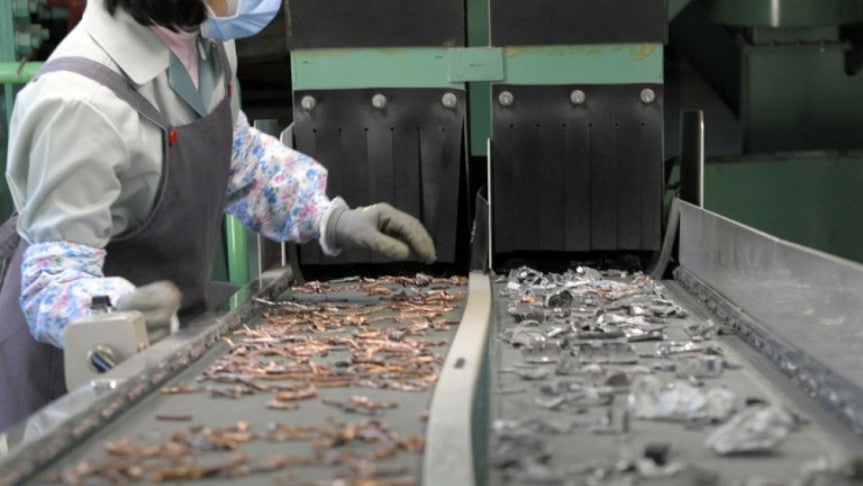Auto, power firms save millions swapping copper for aluminium

London: Manufacturers are abandoning copper for its lighter and cheaper rival aluminium after a decade of technological innovation that is saving some companies hundreds of millions of dollars.
Japanese auto giant Toyota and Saudi’s power company are among those making the switch while Sapa, a supplier of aluminium components, said it has seen a pickup in demand.
Some sectors including shipbuilding, building construction and electric circuitry will still need copper’s high conductivity, flexibility and durability.
But developments in aluminium wiring that compensate for lower conductivity and less flexibility, new ways to stop corrosion and more efficient conductors, mean there is more scope to replace copper in power grid cables, auto wiring, air conditioning and refrigeration systems.
Saudi Electricity Co. said it has already saved 2.4 billion riyals ($640.09 million) by shifting from copper to aluminium in its medium voltage distribution network.
‘We started more than a year ago and we plan to continue,’ SEC’s Chief Executive Ziyad Alshiha told Reuters.
A push for innovation to overcome the obstacles to substituting the two metals gathered speed in 2011 when copper prices spiked to $10,000 a tonne while aluminium, suffering from a supply glut, was $2,525.
The price gap has more than halved, but aluminium is still around $3,400 cheaper than its rival.
‘Ten years of high (copper) prices incentivised many players involved throughout the supply chain to invest in the R&D and make more substitution possible,’ said analyst Patrick Jones at Nomura in London.
‘Now we’re starting to see some results on this front.’
POWER GRIDS, CAR WIRES
The biggest potential for switching from copper is in the power sector, where aluminium is already widely used in overhead high-voltage cables from power stations but is now attractive for wiring branching off from substations.
Japan’s Kansai Electric Power last year began replacing 50-year-old copper distribution cabling in Osaka prefecture with aluminium. A spokesman said its plans to replace some 140,000 km of copper cabling over 30 years would save tens of billions of yen.
Their new aluminium wires compensated for the downside of being thicker with a dimpled design that reduces wind pressure and helps repel snow meaning they can use existing electric poles and lower the risk of cables snapping, the spokesman said.
The automotive sector also has benefited from innovations, boosting the potential for further use of lightweight aluminium to help the industry cut vehicle weight to help meet stricter emission standards.
Having already switched to aluminium radiators from copper, it had been cautious of expanding the use to wiring, partly because aluminium is more susceptible to corrosion.
But Japan’s Furukawa Automotive Systems, a unit of Furukawa Electric Co, has developed new corrosion-proof terminals for aluminium wires in a harness, the backbone of a car’s electrical system, a spokesman said.
Furukawa has been supplying aluminium wire harness systems to Honda’s light vehicles and Toyota’s luxury vehicles.
‘We expect aluminium wire harnesses for use in vehicles will grow and make up about 30 percent of the market in Japan by 2025, compared to only a few percent now,’ he said.
A spokesman for Toyota Motor Corp, the world’s biggest selling automaker, confirmed the use of aluminium harnesses in its Land Cruiser, but declined to reveal plans for other models.
Germany’s Leoni started supplying aluminium cables for luxury cars about five years ago, and is expecting to expand to mass-market autos, spokesman Sven Schmidt said.
A car can be about 1 kg lighter if aluminium cables are used instead of copper and this difference is expected to climb to 4 kg within five years, he said.
Air conditioning and refrigeration is another area of competition for the two metals. Sapa supplies aluminium components to air conditioner makers and said in a presentation it expects sales growth after improvements in aluminium tubing made them more competitive as a replacement for copper tubes.
COPPER MARKET
As more companies make the switch, the impact on the copper and aluminium markets could be substantial.
Benchmark copper prices on the London Metal Exchange slumped by about a quarter last year on fears that a slower economy could lead to lower demand from China, the world’s biggest consumer of metals.
And China is likely to need 100,000-250,000 tonnes less copper this year, Goldman Sachs has estimated, because the authorities released quality standards for low-voltage aluminium alloy power cables, giving industrial users more confidence to replace copper ones.
‘Substitution could pose a significant threat to copper demand over the next decade, which could add up to 2-3 million tonnes a year of total demand destruction,’ Nomura’s Jones said in a note.
The copper industry plays down the threat, saying many industrial users are still wary of a switch. Global copper demand will rise to 22.2 million tonnes this year from 21.9 million in 2015, according to Thomson Reuters data.
‘In the automotive sector, there’s risk of possible technical failure, warranty claims and the unknown aspect of using aluminium with all of its technical issues,’ said Colin Bennett, global market analyst with the European Copper Institute.
‘In the overall market, the actual loss from substitution is really a blip because the larger market for copper is growing.’ ($1 = 3.7495 riyals)

 Reuters
Reuters




